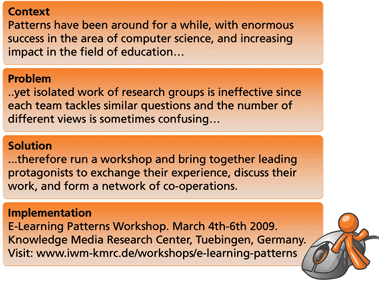
Home
| Call for Abstracts | Registration
| Program Formative
e-Assessment: case stories, design patterns and future scenario
Caroline
Daly, Harvey Mellar, Yishay Mor, Norbert Pachler
London Knowledge Lab
This paper will present an overview of a recent Joint Information Systems
Committee (JISC) funded project entitled 'Scoping a vision for formative
e-assessment (FEASST)' (June 2008 – January 2009) led by the WLE
Centre for Excellence and the London Knowledge Lab (http://snipurl.com/feasst
and http://feasst.wordpress.com/).
The project team carried out a literature review across the areas of
(formative) assessment (incl. assessment for learning), e-assessment
and formative e-assessment with a view, among other things, to establish
a domain map. The project took place against the background of an increasing
recognition in the UK that the important work on formative assessment
and assessment for learning carried out largely within the school sector
should find more widespread inclusion in post-16 pedagogy. In the latter
summative approaches to assessment still prevail and formative assessment
often remains conceptualized simply as distributed summative assessment.
The increasing prevalence of digital technologies in teaching and learning
represents a further challenge. As a project team we were particularly
interested in the human-centric, social dimension, rather than a data-centric
perspective, on e-assessment. By request of the funders, e-portfolios
were without our purview.
Using the design pattern methodology, the project developed a range
of case studies of formative e-assessment with practitioners across
a range of settings (from Primary to Higher education) through a series
of Practical Enquiry Days. From a selection of these cases we abstracted
patterns, the richest of which, in turn, we analysed against the findings
from the literature review. We also subjected the patterns to the scrutiny
of a group of software developers with a view to deriving some illustrative
pedagogical and technical scenarios of use from them. In a synoptic
final step we mapped the case studies as well as the patterns and scenarios
abstracted from them to the domain map. In this paper we will provide
an overview of the project, with particular reference to our methodology,
and we will discuss an illustrative number of cases, patterns and scenarios.
Back
to program schedule
|

|

